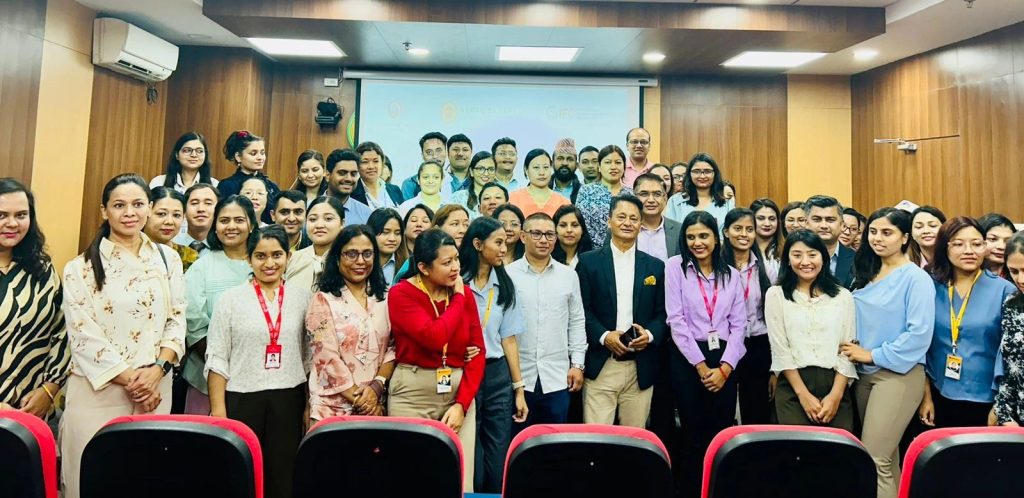Nepal Bankers’ Association (NBA) in a partnership with the International Finance Corporation (IFC) organized first series of Digital Awareness Program at NBA office. The workshop served as a platform for knowledge sharing and discussion on various aspects of digital financial services. It acted as a refresher on the day to day used digital services by the customers of the banks and provided the opportunity to discuss new initiatives, policies and technologies.

Mr. Anil Sharma, Executive Director of NBA kicked off the workshop program highlighting how it could help the participants in enhancing their knowledge on the digital financial services. Mr. Ashim Nepal, from IFC Nepal, shared the objectives of the event and about the IFC’s ongoing project DFS Nepal including efforts of IFC in supporting Nepal Rastra Bank with policy reforms in the digital financial services of Nepal. He also shed light on potential strategies to promote financial inclusion at the ground level in terms of digital financial literacy for consumers especially with user accessibility and safety. Presentation on “Digitally Empowered Employees” and subsequent interactive sessions were led by Mr. Sanjib Subba, where he presented the different digital financial services and products in Nepal and how their usage can be enhanced to promote digitally inclusive financial sector.

Discussions delved into the evolution of Nepal’s banking sector, highlighting milestones like card switch technology and its advantages over traditional payment methods. The workshop unpacked the regulatory framework surrounding digital transactions, along with the recent regulatory changes made by Nepal Rastra Bank to support the digital financial services ecosystem.
Recognizing the potential of AI, the sessions explored how digital solutions and AI integration can empower digital financial inclusive accessibility and better usage efforts. One of the significant examples discussed was about the interoperability of KYC with efforts in standardizing the citizen’s information with National Identity Document.
Equipping participants with practical knowledge, the workshop emphasized the importance of various digital channels and already implemented regulatory changes that can simplify KYC procedures for small vendors for enhancing electronic payment acceptance. It also helped the participants learn more about Payment Service Providers (PSPs) and Payment System Operators (PSOs), along with their respective regulatory frameworks. Policy-level revisions aimed at reducing operational costs, increasing digital payments, and fostering financial inclusion were also among the key focuses of the workshop.
The session didn’t shy away from emerging technologies. Discussions touched upon low cost, agile and scalable digital lending including Buy Now Pay Later (BNPL) services, and the critical role of AI-powered credit scoring models in consumer financing. The session also addressed digital lending practices, remittance services, and the importance of QR code interoperability, consumer rights in terms of its use, and its standardization.

One of the major highlights of the workshop included the concerning rise of cyber frauds, with a specific focus on how older generations and vulnerable communities have become the easy targets to social engineers. The presenters also added to this emphasizing on the importance of continuous efforts by banking officers to educate consumers on potential fraud techniques and equip them with fraud identification and dodging tactics. Furthermore, the conversation addressed other cyber fraud-related issues prevalent in Nepal, emphasizing the need for a multi-pronged approach to ensure a secure digital financial ecosystem.
Participants were also curious over the feasibility of virtual cards and the possibility of free POS systems (free MDR similar to QR codes) that underscored the need for uniform digital transaction charges.
Overall, the workshop equipped the Banking officers of different banks from Nepal with valuable knowledge and tools to promote digital financial services assuring the inclusion of the users and their accessibility with the digital financial services and products in Nepal.




